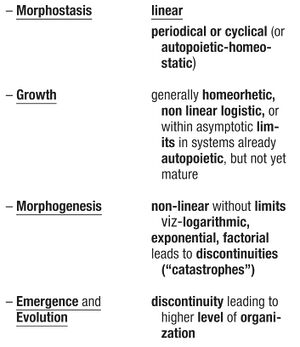CHANGE (Forms of)
| Collection | International Encyclopedia of Systems and Cybernetics |
|---|---|
| Year | 2004 |
| Vol. (num.) | 2(1) |
| ID | ◀ 396 ▶ |
| Object type | General information, Methodology or model |

We do not generally pay much attention to the concept of change and as a result, our evaluations of some changes that we witness are frequently erroneous or out of step with reality.
If we consider change in systems and systemic processes, we may establish the following tentative classification of its different possible modalities.
The correct understanding of the kind of change in a process or a system is of paramount importance for better predictability.
Moreover some specific type of systems or processes change generally depends on the stability or instability of their meta (or supra) system or environment.
Some authors (viz. WILDEN, 1972) seem to understand morphogenetic change as cyclically autopoietic. Others (viz. WADDINGTON) consider homeorhetic growth as morphogenetic. Contrarywise ROBB considers that “unexpected degrees of freedom appear” which may lead to “emergence of order at a higher level… or collapse” (1990, p.140).
The very basic concept of change is now modified by the recent developments of the theory of Self Organized Criticality . P. BAK writes: “Any small change of any event (Note of the editor: or possibly any different small event - or in any case simply any event , even small) will sooner or later affect everything in the system. If the initial event caused a large avalanche , the effect will take place sooner rather than later” (1996, p.159)